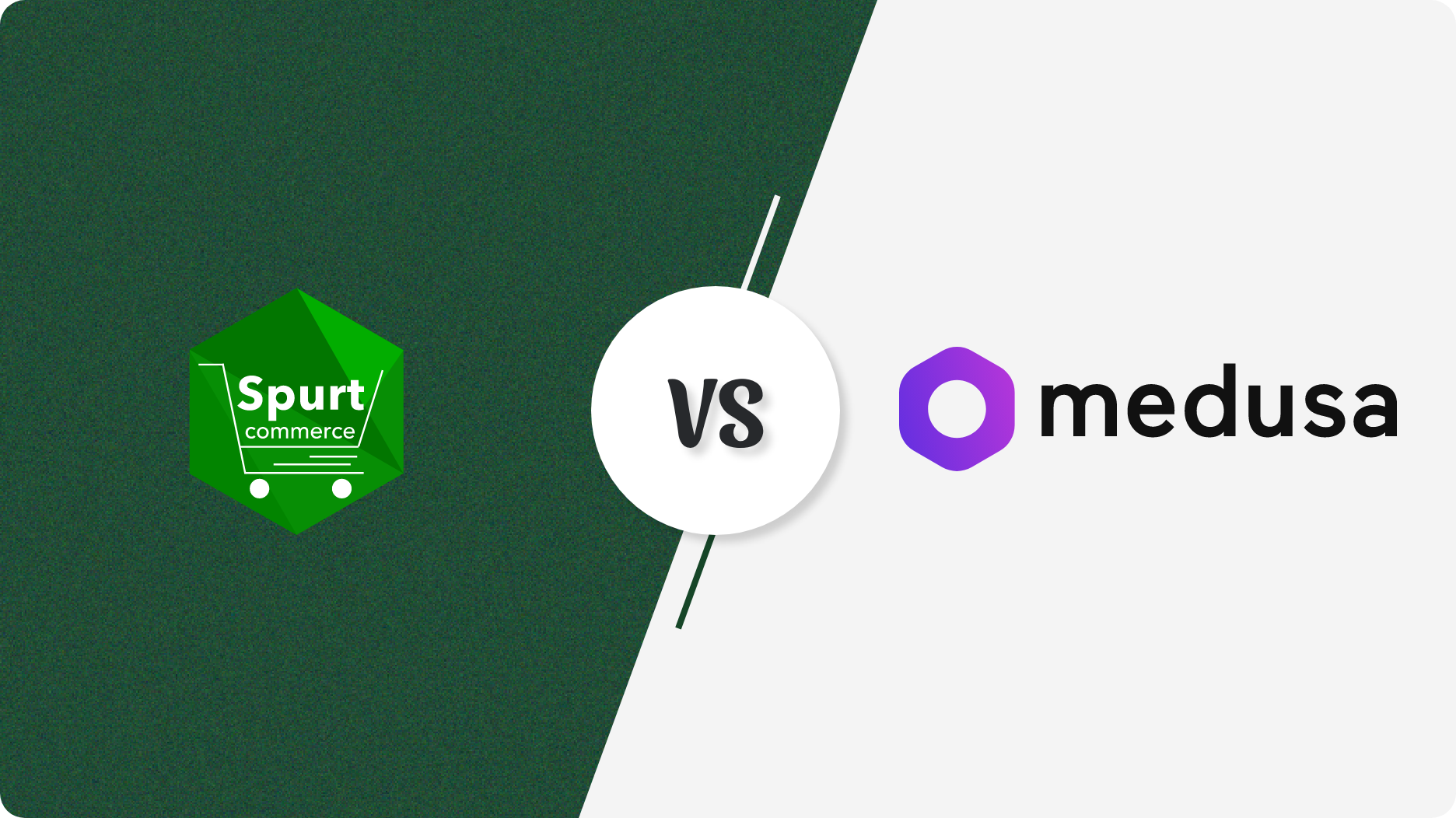COMPARISON
Spurtcommerce vs MedusaJS

A Practical Comparison for Modern E-commerce Development.
Overview
This page compares Spurtcommerce and MedusaJS, two e-commerce platforms built using Node.js with a focus on headless architecture and API-first design. While both offer flexibility, they serve different types of teams and project needs. The comparison looks at their core architecture, flexibility to extend, support for marketplace features, mobile options, frontend availability and common use cases, that could help businesses decide which platform aligns best with their goals.
About Spurtcommerce
Spurtcommerce is a developer-friendly, ready-to-use e-commerce solution built on Express.js. It supports both direct-to-consumer and multi-vendor marketplace models. Designed with a modular, headless structure, it offers prebuilt admin, storefront and seller panels, along with a mobile app powered by Flutter. Teams can customize themes using Angular or React based storefronts, and extend functionalities using a growing list of AddOns. For enterprise users, the full source code is available, including microservices, enabling complete control and flexibility.
Spurtcommerce is ideal for businesses and developers looking to launch fast with ready-made e-commerce features while retaining the freedom to scale and customize without touching the core system.
About MedusaJS
MedusaJS is a flexible headless commerce engine designed for developers who want to build their platform from the ground up. It provides powerful APIs, plugin-based architecture and backend customization through workflows and event subscribers.
MedusaJS emphasizes extensibility through code, offering backend support for complex needs like multiple sales channels, multi-region inventory and advanced promotions. While Medusa does not come with a prebuilt storefront or seller panel, it enables complete backend control. Developers can create fully custom frontends using the tools of their choice and extend the admin interface with widgets and routes through plugins.
Key Differences – Spurtcommerce vs MedusaJS
| FEATURE | SPURTCOMMERCE | MedusaJS |
|---|---|---|
| Architecture | Built on Express.js, headless and modular, Available both in Monolithic & Microservices | Custom Node.js framework with plugin system and workflows |
| Backend Framework | Standard Node.js + Express.js (familiar & widely used) | Node.js with custom layered framework over Express |
| Learning Curve | Low – uses conventional Express structure and ready UI components | High – requires understanding plugins, workflows, and modules |
| Frontend Options | Ready-made Angular and React (Next.js) storefronts | Developers must customize their own React/Next.js frontends |
| Mobile App | Flutter-based app included in enterprise version | Community-driven Flutter and React Native apps available |
| Marketplace Support | Available out of the box, with seller panel and commission handling | Must be custom built using APIs and plugins |
| UI Panels | Includes ready-made admin, storefront (Angular or React or Flutter) and seller panel | Only backend APIs are extensively provided, UIs needs customization |
| Add-on Ecosystem | Possible - Includes SEO, chat, | Limited; Custom plugin |
| Extensibility | Add-ons can be built and integrated by seamlessly extending core code | Plugins, workflows and subscribers used to extend functionality |
| Customization Effort | Lower, due to prebuilt UIs and Add-on support | Higher, requires custom development, mainly for seller features |
| Source Code Access | Full access to source code in enterprise version | Core modules available only via npm packages |
| B2C/D2C Readiness | Fully ready with no extra development needed | Requires full frontend development |
| Built-in Functional Features | Order/Quotation/Return management, CRM, promotions, SEO, reporting, CMS, stock & product variants, multilingual, analytics, etc. | Core features like cart, checkout, pricing, inventory, RMA, multi-region & currency per |
| Theme/UI Customization | Easily customizable for MERN/MEAN developers (Angular, React supported) | Possible, however frontend dev overhead required |
| Deployment Flexibility | Supports monolithic and microservices deployment | Plugin-based, ideal for service-oriented builds |
| Time to Launch | Fast – Ready-made UI, APIs, seller & mobile modules | Medium to long – Requires building or integrating multiple layers |
Spurtcommerce is ideal for:
- Teams that want to launch quickly with a complete multi-vendor marketplace or B2C storefront.
- Developers looking for customizable frontends in Angular or React.
- Businesses needing full code ownership, including backend and microservices.
- Projects where plug-and-play extensions like SEO tools, chat or CRM are important.
- Startups and small to mid-sized businesses looking for fast time-to-market.
MedusaJS is ideal for:
- Developers building highly custom, backend-first commerce platforms.
- Teams with strong backend focus that prefer to create their own UIs.
- Companies with specific architecture needs like multi-region inventory or sales channels.
- Projects that need fine-grained plugin control, advanced workflows and rule-based logic
- Businesses comfortable with building essential components like storefronts and seller portals from scratch.
Conclusion
MedusaJS is better suited for teams who want to craft their platform with precise backend logic and deep extensibility, even if that means developing most user-facing features from scratch.
Spurtcommerce is a great choice if you’re looking for a practical, feature-rich e-commerce solution with marketplace support, UI components and mobile apps included. It lets teams move faster with less effort, while still allowing for customization and scalability.



 En
En Es
Es Ar
Ar